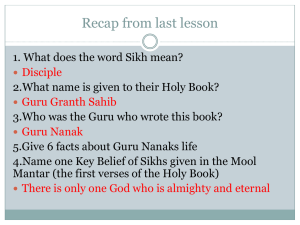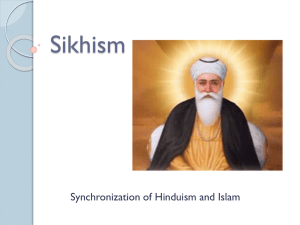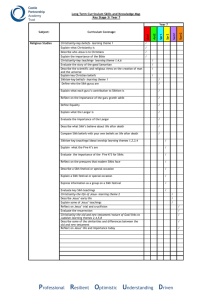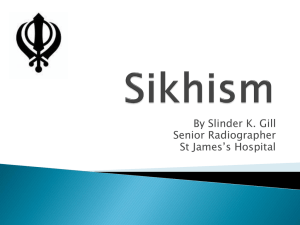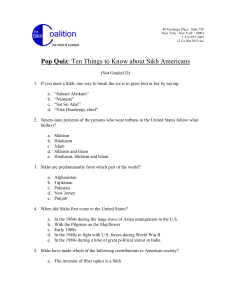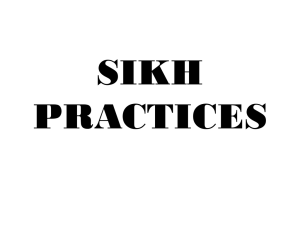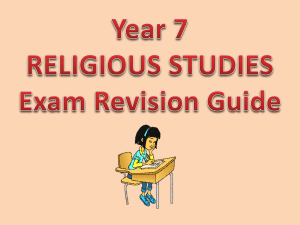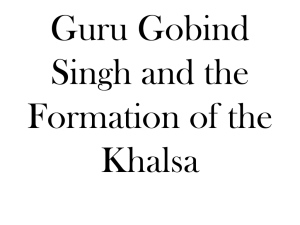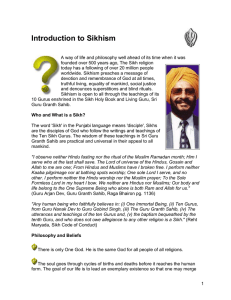Sikh Awareness
advertisement
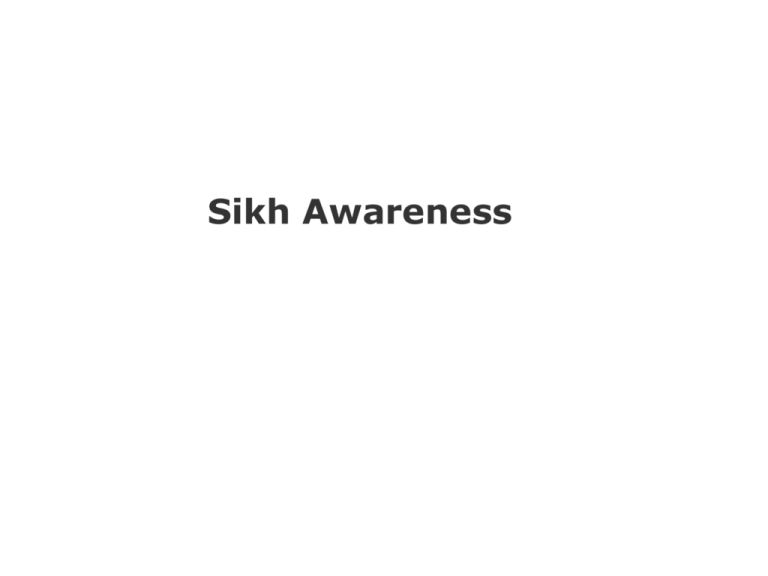
Sikh Awareness Who are the Sikhs? Sikh means “student” or “disciple” Sikhism is world’s 5th largest religion, after Christianity, Islam, Hinduism, and Buddhism 26 million Sikhs worldwide — — 20 million in Punjab 1 million in North America 99 % of the people wearing turbans in America are Sikhs Guru Nanak: Birth of a Revolutionary Punjab (the land of Five Rivers) Born in 1469; Village Talwandi Socio-political environment — — — — — — Land divided by religion Ruled by invaders from Persia & Afghanistan Rich exploited the poor Castes: Untouchables had no rights Women had no role Superstitions & Rituals Guru means “Spiritual Enlightener” Spread the revelation across 8000 miles on foot Defender of human rights and equality Tolerant of other’s perspective and freedom of choice Often used metaphor and analogy to communicate Basic Sikh Beliefs There is One God for all of creation, a loving Creator attainable through the Grace Loving remembrance and devotion of the One Absolute equality of humanity Living a moral, truthful and hardworking existence Selfless service towards the entire Creation Humility and loving action Defending the rights of the downtrodden and oppressed The Sikh Revolution Timeline Adi Granth Compiled (1604) Guru Nanak (1469-1539) Columbus discovers America Martyrdom Guru Tegh Bahadur (1606) Creation of Khalsa -5 K’s (1699) Guru Gobind Singh (1666-1708) Maharaja Ranjit Singh (1780-1839) Golden Temple Foundation (1588) Martyrdom Guru Arjan Dev (1606) Guru Nanak was followed by nine Gurus (same spirit). Evolution of Distinct Identity Distinct script – Gurmukhi Distinct community - Sangat, Pangat, Dharamsala — — Liberation and empowerment of women — — Education, Physical well being (wrestling) Against Sati (widow immolation), Pardah (Veil) Supported widow remarriage Manji (Seats of Authority) system (22 Manjis) — — 4 women bishops and preachers Collection of money for social/religious causes (daswand) Distinct Ceremonies (birth, naming, marriage) People of the Book — Adi Granth compiled and installed by the Fifth Guru Miri Piri (Temporal – Spiritual) — Sikhs were to lead active lives both in temporal and spiritual realms Formalization of Identity Baisakhi 1699 Concept of Khalsa — — — Amrit — — Saint Soldier 5 K’s Dedicated to service of Humanity A public declaration and A private commitment Singhs and Kaurs — Caste/Class less society Guru Granth and Guru Panth After Guru Gobind Singh, the tenth Guru Spiritual Guru, Sri Guru Granth Sahib (The Sikh scripture) — — — — 1430 pages The Gurus’ Experience of the Divine Also included were consistent teachings from Hindu and Muslim saints Gurmukhi script Temporal Guru, Guru Khalsa Panth (the charismatic Sikh community) Articles of Faith 5 K’s – mandatory articles of faith Kesh – Uncut hair Kirpan – Religious sword Karra – Steel bracelet Kangha – Wooden comb Kachehra – Boxer shorts Kangha Dastaar – the Turban Mandatory – not a social or cultural article. Symbolic of sovereignty of humans. Always be recognized and duty bound to offer help. Sikhs wearing it for the last 500 years. Removal of turban in public is tantamount to a strip search. Stand for social justice of all people. Gurudwara – “Door” to the “Guru” Everyone welcome Services typically held on Weekends Language – Punjabi Langar (Community Kitchen) Local Contact Information Planned Visits Sikhs in North America Arrived around late 1890’s Places — — California, Oregon and Washington British Columbia Farming & Lumber Industry Immigration Barriers by 1920’s Vancouver Diamond Jubilee 1897 Hong Kong Regiment San Francisco Chronicle, April 6, 1899 Sikhs in America 1920’s – 1950’s — — — Reverse Immigration Freedom struggle against British imperialism Partition of Punjab 1947 bw. India and Pakistan 1950’s – today — — — End of immigration controls Professionals, Extended Families Refugees (1980’s and 1990’s) Some Sikh Public Faces Gurbax Singh Mahli First Turbaned Sikh in Canadian Parliment Palbinder Kaur Human Rights Lawyer Narinder Singh Kapani Father of Fiber Optics T Sher Singh Recognized with the Order of Canada Baltej Singh Dhillon First Turbaned Sikh in Royal Canadian Mounted Police Some Sikh Public Faces Nuvraj Singh Bassi University of Oregon Football Player Colonel Sekhon United States Army Amrit and Rabindra Kaur Artists Bhagat Singh Thind US Army 1912 CHALLENGES TODAY….. Challenges after September 11, 2001 HATE CRIMES and BIAS INCIDENTS Misunderstood and Targeted because of their turbans and appearance First 3 months – More than 250 hate crimes recorded Vandalism, assault – verbal/physical, fatalities Balbir Singh Sodhi – first victim of Post 9/11 Hate in Mesa, AZ His brother killed 9 months later in San Francisco, CA Events such as Iraq war continue to affect the community <provide local context> Challenges after September 11, 2001 EMPLOYMENT DISCRIMINATION Several cases of Sikhs being told to remove their turbans or they will be fired Before 9/11 employment discrimination was the biggest civil rights issue for Sikh-Americans, many are afraid that now hate crimes have gone down, employment discrimination will go up. Difficulties finding employment Racial Profiling – airports/transportation and law enforcement Reinforcement of stereotypes NYPD “no-turbans” policy — The Sikh Coalition and Amric Singh Rathour filed a federal lawsuit challenging the New York Police Department’s (NYPD) “no turban” policy. Amric Singh was terminated by the NYPD in August 2001 for refusing orders to remove his turban and trim his beard, both required by his religion Challenges after September 11, 2001 SCHOOL HARASSMENT Since September 11, 2001, there has been a significant increase in violent attacks and bullying of Sikh students. Many of these attacks are by middle school children. In Seattle, Atlanta, New York, Maryland, Sikh children have been the target of violent attack because of their religion. Challenges after September 11, 2001 KIRPAN Since September 11, 2001, the Sikh Coalition has defended six Sikhs who were prosecuted for wearing the kirpan from New York City to Wisconsin to Tennessee. Charges in all six cases were dismissed. There is no criminal intent in wearing a kirpan. It an article of faith. There are exemptions in many jurisdictions for boy scouts or knives salespersons to carry instruments whose blades are longer than the legal limit. Before 9/11, Sikhs were generally not arrested for wearing the kirpan. France: Secularism? On December 11, 2003, a commission appointed by the government of France, issued a report recommending that all “conspicuous articles of faith” in French public schools be banned. These Signs Include: — Muslim Hijaabs — Sikh dastaars — Jewish Skullcaps — Christian Crosses More than 5000 Sikhs live in the greater Paris area alone. This would effectively ban French Sikh children from being educated in French public schools. No French Sikhs were amongst the more than 200 people interviewed in the six month preparation of the recommendation to the French president
